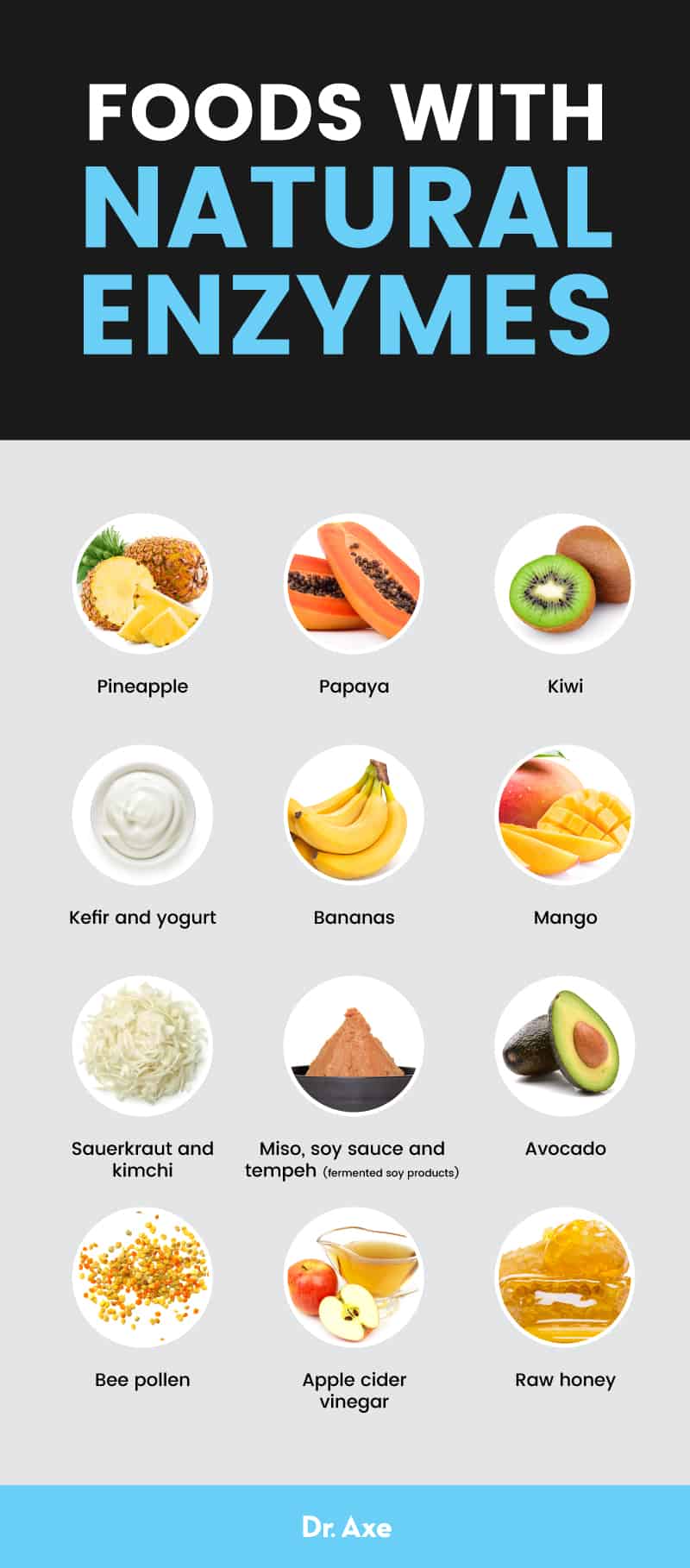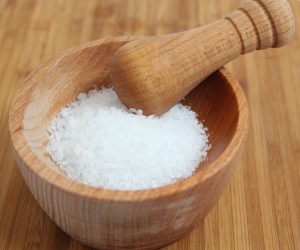
Do Digestive Enzymes Prevent Nutrient Deficiencies & Boost Gut Health?
Dr. Josh Axe, DC, DNM, CN – The phrase “you are what you eat” is halfway accurate. The real truth is: You are what you digest. Therefore, are digestive enzymes key to better digestion, gut health and nutrient absorption?
Surprising as it may seem, up until relatively recently, little was known about how your digestive system actually works. Today, there’s a growing incidence of illnesses that, when traced back to the source, appear to be linked to nutrient malabsorption due to a lack of digestive enzymes.
Why are enzymes for digestion important in avoiding illness? The role of digestive enzymes (DE) is primarily to act as catalysts in speeding up specific, life-preserving chemical reactions in the body.
Essentially, they help break down larger molecules into more easily absorbed particles that the body can actually use to survive and thrive.
What Are Digestive Enzymes?
Digestive enzymes are definedas “enzymes that are used in the digestive system.”
All enzymes are catalysts that enable molecules to be changed from one form into another. These enzymes help us digest foods by breaking down large macromolecules into smaller molecules that our guts are capable of absorbing, thus supporting gut health and making sure the nutrients are delivered to the body.
Types:
What are the main digestive enzymes? They are split into three main classes:
- proteolytic enzymes that are needed to metabolize proteins
- lipases needed to digest fats
- amylases needed to break down carbohydrates
There are various types of DE found in humans, some of which include:
- Amylase — Found in saliva and pancreatic juice, works to turn large starch molecules into maltose. Needed to metabolize carbohydrates, starches and sugars, which are prevalent in basically all plant foods (potatoes, fruits, vegetables, grains, etc.).
- Pepsin — Which enzyme breaks down protein? Found in the gastric juice within your stomach, pepsin helps turn protein into smaller units called polypeptides.
- Lipase — Made by your pancreas and secreted into your small intestine. After mixing with bile, this turns fats and triglycerides into fatty acids. Needed to properly absorb foods like dairy products, nuts, oils, eggs and meat.
- Trypsin and chymotrypsin — These endopeptidases further break down polypeptides into even smaller pieces.
- Cellulase — Helps with digestion of high-fiber foods like broccoli, asparagus and beans, which can cause excessive gas.
- Exopeptidases, carboxypeptidase and aminopeptidase — Help release individual amino acids.
- Lactase — Turns sugar lactose into glucose and galactose.
- Sucrase — Cleaves the sugar sucrose into glucose and fructose.
- Maltase — Reduces the sugar maltose into smaller glucose molecules.
- Other enzymes that help with absorption of sugar/carbs include invertase, glucoamylase and alpha-galactosidase.
How Do Digestive Enzymes Work?
Digestion is a complex process that first begins when you chew food, which releases enzymes in your saliva. Most of the work happens thanks to gastrointestinal fluids that contain DEs, which act on certain nutrients (fats, carbs or proteins).
We make specific DEs to help with absorption of different types of foods. In other words, we produce carbohydrate-specific, protein-specific and fat-specific enzymes.
DEs aren’t just beneficial — they’re essential. They turn complex foods into absorbable compounds, including amino acids, fatty acids, cholesterol, simple sugars and nucleic acids (which help make DNA).
They are synthesized and secreted in different parts of your digestive tract, including your mouth, stomach and pancreas.
Below is an overview of the six-step digestive process, starting with chewing, that triggers DE secretion in your digestive tract:
- Salivary amylase released in the mouth is the first DE to assist in digestion of molecules, and that process continues after food enters the stomach.
- The parietal cells of the stomach are then triggered into releasing acids, pepsin and other enzymes, including gastric amylase, and the process of degrading the partially digested food into chyme (a semifluid mass of partly digested food) begins.
- Stomach acid also has the effect of neutralizing the salivary amylase, allowing gastric amylase to take over.
- After an hour or so, the chyme is propelled into the duodenum, where acidity triggers the release of the hormone secretin.
- That, in turn, notifies the pancreas to release hormones, bicarbonate, bile and numerous pancreatic enzymes, of which the most relevant are lipase, trypsin, amylase and nuclease.
- The bicarbonate changes the acidity of the chyme from acid to alkaline, which has the effect of not only allowing the enzymes to degrade food, but also killing bacteria that are not capable of surviving in the acid environment.
At this point, for people without DE insufficiency (lack of digestive enzymes), most of the work is done. For others, supplementation is needed and helps this process along.
This can even be true for pets, since there are several benefits of digestive enzymes for dogs, digestive enzymes for cats and for other animals too.
Who Needs Them? (Signs of Deficiency)
The answer to the increasingly asked question — “Who should take digestive enzymes?” — may ultimately turn out to be many more people than you might expect.
People who experience symptoms like bloating, gas, abdominal pain and fatigue due to undigested foods may benefit from a DE supplement. Other signs that you might lack DEs include:
- Acid reflux
- Dyspepsia (pain or an uncomfortable feeling in the upper middle part of your stomach area)
- Cravings for certain foods
- Thyroid problems
- Heartburn, indigestion or burping
- Hair that is thinning or falling out
- Dry or lackluster skin
- Trouble concentrating or brain fog
- Morning fatigue
- Trouble sleeping well
- Arthritis or joint pain
- Muscle weakness or feeling too tired to exercise
- Mood swings, depression or irritability
- Headaches or migraines
- Worsened PMS
People with the following health conditions can likely experience some relief from taking a DE supplement:
1. Digestive Diseases
If you have any type of digestive disease — such as acid reflux, gas, bloating, leaky gut, irritable bowel syndrome (IBS), Crohn’s disease, ulcerative colitis, diverticulitis, malabsorption, diarrhea or constipation — then DEs may be able to help.
They can help take stress off of the digestive organs and decrease symptoms like abdominal pain and bloating that are associated with gastrointestinal disease.
2. Age-Related Enzyme Insufficiency
As we age, the acidity of our stomach acid becomes more alkaline, and this can prevent enough pancreatic secretions from being released.
Concurrent illnesses aside, as we age there’s increasing suspicion that digestive problems may result from either low stomach acid or DE insufficiency, which are thought to be common causes of acid reflux.
3. Hypochlorhydria
Hypochlorhydria (having too little stomach acid) makes it hard for minerals, vitamins and nutrients to be “cleaved” or released from food while in the GI tract, and if this action fails, then nutritional insufficiency is usually the result.
4. Liver Disease and Other Enzyme-Related Illnesses
Anyone with liver disease should be suspected as having a concurrent enzyme insufficiency. One of the more common conditions is known as alpha-1 antitrypsin deficiency, a genetic disorder that affects roughly one in 1,500 people worldwide.
Symptoms that may be experienced include unintentional weight loss, recurring respiratory infections, fatigue and rapid heartbeats.
There illnesses (that may at first diagnosis appear unrelated to low DE production) include:
- Crohn’s disease
- Iron deficiency or vitamin B12 deficiency
- Vitamin D deficiency
Other symptomatic indicators of enzymatic insufficiency are:
- Stool changes — If the stool is pale and floats in the toilet bowl or if it’s greasy or fatty.
- Gastrointestinal complaints — Stomach distention and diarrhea, especially around an hour after eating. Flatulence and indigestion are also indicative.
5. Pancreatic Insufficiency
Pancreatic insufficiency is the inability of the pancreas to secrete the enzymes needed for digestion. This is a common problem among people with pancreatic cancer.
Prescription pancreatic enzyme products (also called called replacement therapy) may be used in patients with pancreatic cancer, chronic pancreatitis, cystic fibrosis and after surgery on the gut to help promote healing.
Best Natural Sources (Foods)
Many raw plants, such as raw fruits and vegetables, contain enzymes that aid in their digestion.
Raw fruits and vegetables grown in nutrient-rich soils are the best natural sources of DEs, so make sure to buy more of these when you shop for groceries:
- Pineapple
- Papaya
- Kiwi
- Kefir and yogurt
- Bananas
- Mango
- Miso, soy sauce and tempeh (fermented soy products)
- Sauerkraut and kimchi
- Avocado
- Bee pollen
- Apple cider vinegar
- Raw honey

Digestive enzyme supplements are derived mostly from three sources:
- Fruit-sourced — usually pineapple– or papaya-based. Bromelain is an enzyme derived from pineapple that breaks down a broad spectrum of proteins, has anti-inflammatory properties and can withstand a broad pH (acidic/alkaline) range. Papain is another enzyme that’s derived from raw papaya and works well to support the breakdown of small and large proteins.
- Animal-sourced — including pancreatin sourced from ox or hog.
- Plant-sourced — derived from probiotics, yeast and fungi.
Supplements
Because proteins, sugars, starches and fats all require specific types of enzymes, it’s best to take a supplement that covers all the bases.
Many experts feel that the best digestive enzymes in supplement form are those that contain a full-spectrum blend intended for general digestive improvement. Look for a supplement that includes a variety of enzymes, including some of the following (price may vary depending on the supplement you purchase):
- Alpha-galactosidase (this is the enzyme found in Beano®, derived from Aspergillus niger, which is said to help with carbohydrate digestion)
- Amylase (produced by the salivary glands)
- Cellulase
- Glucoamylase
- Invertase
- Lactase
- Lipase
- Malt diastase
- Protease (or acid proteases)
- Peptidase
- Beta-glucanase
- Pectinase
- Phytase
Here are some tips for purchasing DEs based on your symptoms and current health:
- If you have gallbladder issues and are looking for a gallbladder natural treatment, purchase one with more lipase and bile salts.
- Where you see betaine HCL listed as a product ingredient, make sure pepsin is also included.
- Others contain lactase, which until recently was only available as an individual product. This enzyme is designed to assist those with specific issues relating to sugar absorption from dairy products.
- Consider a supplement that contains protease, which helps with protein digestion, if you have an autoimmune or inflammatory condition.
- Choose a blend with herbs, such as peppermint and ginger, that also support digestion.
- Also, because some people need more pancreatic enzymes than others, you need to bear in mind the level of each is dependent on your needs. Most products contain some level of pancreatin, which is a combination of all three pancreatic enzymes.
Are vegan DE supplements available?
Some products contain only plant-based enzymes, which are aimed at vegetarians and vegans. These usually at least contain bromelain derived from the pineapple, and many include papain enzyme from the papaya.
Products designed specifically for vegans usually contain pancreatin derived from Aspergillus niger. This is a fungus-based, fermented product rather than an enzyme sourced from ox or hog bile, which is the usual source.
In addition, some have complementary herbs and spices. Amla (gooseberry) extract — which isn’t an enzyme, but an herbal remedy from Ayurveda medicine taken for general well-being — is often included. It’s believed to work in synergy with the other compounds.
When should you take digestive enzymes?
For optimal results, take DEs about 10 minutes before each meal or with your first bite. Protease supplements can be taken in between meals in addition to DEs with meals.
Start by taking enzymes with about two meals per day, and adjust your dosage as needed as the days move on.
Can you take probiotics and digestive enzymes at the same time?
Yes. Take enzymes before a meal and probiotics after or between.
It’s also beneficial to get probiotics from fermented foods like yogurt, kefir, kimchi or sauerkraut. Probiotics can help restore balance to the gut microbiome and further aid in digestion, while also curbing symptoms like gas and bloating.
Benefits
Why are digestive enzymes good for you? Mostly because they help us digest foods.
The main reasons why many people should take digestive enzymes are to:
- Help treat leaky gut and other conditions like celiac disease by taking stress off the gastrointestinal tract.
- Support a healthy balance of bacteria and microbes in the gut.
- Assist the body in absorbing difficult-to-digest protein and sugars like gluten, casein and lactose (milk sugar).
- Greatly improve symptoms of acid reflux and irritable bowel syndrome.
- Enhance nutrition absorption and preventing deficiencies.
- Counteract enzyme inhibitors naturally in foods like peanuts, wheat germ, egg whites, nuts, seeds, beans and potatoes.
You might be wondering, do digestive enzymes help you lose weight or burn fat, and will digestive enzymes help with constipation?
If you’re not making enough DEs to help the digestive process unfold smoothly, it’s possible you’ll experience constipation that may improve when you supplement. However, DEs are generally not linked to weight loss and are not intended for this purpose, although they may help curb your cravings and allow you to feel satisfied with less.

Uses in Traditional Chinese Medicine and Ayurveda:
Throughout history, traditional medicine systems emphasized treating poor digestion holistically by making dietary and lifestyle changes, rather than supplementing. Digestive enzymes only became available in supplement form in the past 50 years or so, but long before this people were encouraged to consume raw foods and probiotic foods that naturally supported gut health.
According to the ancient medicinal system Ayurveda, digestion depends on sufficient agni, “or digestive fire.” Agni is said to be improved by removing causes of indigestion (such as eating while stressed or close to bedtime), improving your diet, and using herbs and home remedies to strengthen the digestive organs.
Spices play an important role in supporting digestion in Ayurveda, especially:
- ginger
- turmeric
- cumin
- coriander
- fennel
- cardamom
- fenugreek
- cinnamon
- rosemary
- sage
- oregano
One remedy to improve digestive fire is to drink herbal tea that can help with enzyme functions, such as tea made with one-third teaspoon each of cumin, coriander and fennel that is boiled and strained. Eating papaya is also encouraged, since it naturally provides papain, which is said to manage inflammation.
In Traditional Chinese Medicine, digestion is improved by improving “qi,” or vital energy. Acupuncture, herbs, movement and stress management complement the use of plant-based enzymes that are obtained from eating whole foods.
Raw fruits and lightly cooked veggies are recommended most for digestive support.
Other ways to encourage gut health include:
- eating local/seasonal foods
- choosing organic, unprocessed, non-GMO foods
- limiting intake of added sugar, liquids during meals and cold foods
- chewing foods thoroughly
- not eating within two to three hours of bedtime
- practicing tai chi, yoga, exercise and stretching to increase appetite
Risks and Side Effects
Can digestive enzymes be harmful? If you’re dealing with a chronic health problem, it’s a good idea to visit a health practitioner for help with customized DE therapy.
Depending on your health condition, your doctor can determine which are the safest and best DEs for you to take. If you have a history of liver or gallbladder disease, or ulcers, then consult a physician before taking supplements.
What are potential digestive enzymes side effects? While they are generally well-tolerated and helpful, side effects can sometimes include:
- nausea
- diarrhea
- abdominal cramping
- gas
- headache
- swelling
- dizziness
- changes in blood sugar
- allergic reactions
- abnormal feces
If you suffer these symptoms, don’t continue to take them, and consult with your doctor.
You’re most likely to deal with digestive enzymes side effects if you take a very high dose and ignore dosage recommendations, so always read product labels carefully.
Pancreatic Enzymes vs. Digestive Enzymes
“Digestive enzymes” — aka stomach enzymes — is a broad term that includes pancreatic, plant-derived and fungal-derived enzymes.
Pancreatic enzymes are found in the whopping eight cups of pancreatic juices that most humans produce daily. These juices contain pancreatic DEs that aid in digestion and bicarbonate that neutralizes stomach acid.
Pancreatic enzyme names usually end in -in (like trypsin or pepsin), while other DEs usually end in -ase or -ose (like lactose, sucrose, fructose).
Dealing primarily with fats and amino acids, these enzymes include:
- Lipase — converts triglycerides into both fatty acids and glycerol.
- Amylase — converts carbohydrates into simple sugars.
- Elastases — degrades the protein elastin.
- Trypsin — converts proteins to amino acids.
- Chymotrypsin — converts proteins to amino acids.
- Nucleases — convert nucleic acids to nucleotides and nucleosides.
- Phospholipase — converts phospholipids into fatty acids.
The main enzyme-producing structures of the human digestive system are the salivary glands, stomach, pancreas, liver and small intestine.
The pancreas produces bile salts or acids — which comprise water, electrolytes, amino acids, cholesterol, fats and bilirubin — and these are all sourced from the liver via the gallbladder.
It’s the cholic and chenodeoxycholic acids that, when combined with the amino acids glycine or taurine, produce the bile salts themselves, which are essential for nutrient absorption.
Conclusion
- Digestive enzymes help us digest foods by breaking down large macromolecules into smaller molecules that our guts are capable of absorbing.
- DEs are split into three classes: proteolytic enzymes, lipases and amylases, which all metabolize different macronutrients.
- People who can benefit from taking DE supplements include those with inflammatory bowel disease, IBS, low stomach acid (hypochlorhydria), enzyme insufficiency, pancreatic insufficiency, autoimmune diseases, constipation, diarrhea and bloating.
- DE supplement sources include fruits (especially pineapple and papaya), animals like ox or hog, and plant sources like probiotics, yeast and fungi. It’s best to get a supplement that covers all the bases (a full-spectrum enzyme blend).
- Foods that can continue to provide you with natural digestive enzymes include pineapple, papaya, kiwi, fermented dairy, mango, miso, sauerkraut, kimchi, avocado, bee pollen, apple cider vinegar and raw honey.
To read the original article click here.






